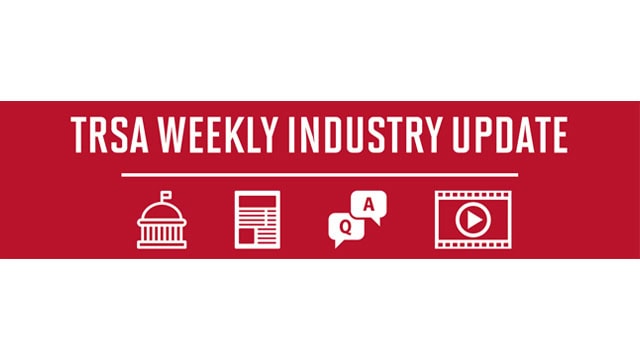Unity Gets Results – Progress on F&B Guidance, PPP Loans

As restaurants reopen, various stakeholders including TRSA, laundry operators and suppliers, restaurant associations and restaurateurs are helping to guide policymakers in ways that can speed a recovery from COVID-19-induced closures. That was a key takeaway from TRSA’s latest Weekly Industry Update on May 28.
The webinar featured several guest speakers, including the head of the Kentucky Restaurant Association, Ben Fox of Alsco Linen and Uniform Rental Services and Charles Crowell of Milliken & Co., each of whom discussed the state of the U.S. restaurant industry and recent progress made in states, such as Kentucky, which recently agreed to alter its guidance to allow for the use of regularly changed table linens, combined with social distancing and other safety measures to allow restaurants to operate safely.
“This was a good example of us working together as an industry and bringing in other stakeholders to win,” said Crowell, who credited Louisville laundry operator Tom Austin of Universal Linen Service LLC, TRSA President and CEO Joseph Ricci; Milliken, a leading textile manufacturer; and Stacy Roof, president and CEO of the Kentucky Restaurant Association with achieving a compromise on table linens. As TRSA Senior Editor Digital/New Media Jason Risley pointed out, local and national media outlets, including USA Today, had also weighed in with positive coverage of the industry’s views on reusable table linens. Click here for details.
Crowell credited Fox with applying the phrase “Whack-A-Mole” as a comic comparison of the situation facing the industry with regulatory mandates from federal agencies such as the Centers for Disease Control and Prevention (CDC), plus 50 states and hundreds of local governments – all of which want to stop COVID-19. In a brief presentation, Roof described her frustration with repeated efforts to convince state officials to drop their restrictions on the use of table linens in restaurants as unworkable and unnecessary.
Single-use items such as plastic tablecloths and cutlery are fine for fast-food restaurants, but plastic won’t work for all food-and-beverage (F&B) businesses. “If you’re a finer-dining establishment or an upscale casual place, it doesn’t make sense for you to do that,” said Roof, speaking to nearly 70 online attendees. “If you’re a steak place you’re not going to give a customer a plastic knife to cut your steak.”
Roof said that in the end, the combined efforts of industry backers, including TRSA Vice President of Government Relations Kevin Schwalb, convinced state leaders, including Gov. Andy Beshear (D), to allow reusable linens—with a fresh cloth for each new group of diners. Roof said that state officials have agreed in principle to relax the restrictions, although they’ve yet to update the state’s on-site guidance materials. Ricci, who serves as emcee for the Weekly Update sessions, said the situation is acceptable. “The guidance is forthcoming,” he said. “It isn’t there yet, but the restaurants are using table linens and they feel comfortable using linens in Kentucky.”
Crowell added that similar efforts by laundry industry and restaurant leaders in other states, such as Massachusetts, have borne positive results. “As Massachusetts opens up, we’ll have a seat at the table,” he said, noting that Boston restaurateur Steve DiFillippo and others have taken an active role in defending table linens in the Bay State.
Meanwhile, industry advocates are continuing a drive to educate policymakers and restaurant operators on how to reopen in ways that will reassure diners not only of safety, but also comfort. “We can help those restaurants bring back their customers together with the right message,” Crowell said. To that end, Fox highlighted a recently initiated social media campaign, with a message that includes a link to a new TRSA-sponsored animation that highlights how restaurateurs can use linens to signify which tables diners can use, leaving space for social distancing. Fox noted that Google/YouTube ads had generated nearly 6,000 online impressions since the campaign’s kickoff last week. “This is great content that you should be giving to your own customer base and sharing on social media to drive the perception that tablecloths, table linen is the way to go,” Fox said. Click here for details.
On another front in the post COVID-19 recovery drive, Schwalb noted that changes were expected in a U.S. House bill to reform the recently enacted Paycheck Protection Program (PPP). “Today, the United States House is taking up a bipartisan initiative to reform the Paycheck Protection Program,” Schwalb said. “The legislation gives businesses more time and flexibility in making qualifying expenditures.” Later that day, the House of Representatives approved a PPP reform bill by a vote of 417-1. The bill includes a shift in the ratio of loan funds that recipients must spend on payroll costs from 75% to 60% in order to qualify for loan “forgiveness,” i.e., conversion to a grant. The loan maturity period also was extended from two to five years in the bill, which the U.S. Senate is expected to take up when it returns on June 1. Click here for details.
TRSA’s Weekly Industry Update debuted on April 16 as an online service aimed at keeping members apprised of COVID-19-related developments. Since the crisis broke in early March, TRSA has aired 25 webinars on the pandemic and related issues. Starting with the June 1 edition, TRSA’s Update webinars will shift to a biweekly format. TRSA also has an on-demand learning library that allows you to “live stream” all of the association’s webinars, including this latest edition. TRSA members can purchase webinars, and other training and educational resources at a reduced member price. Visit www.trsa.org/ondemand to go to TRSA’s On-Demand Learning portal to view this webinar and more.
